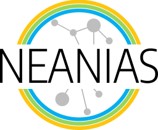The work “Supporting FAIR Principles in the Astrophysics Community: the European Experience“, with the support of NEANIAS project, has been published in Journal on arxiv.org.
- Authors: Marco Molinaro [1], Mark Allen [2], François Bonnarel [2] Françoise Genova [2] Markus Demleitner [3] Kay Graf [4], Dave Morris [5], Enrique Solano [6] and André Schaaff [2]
- Affiliations: [1] INAF - Osservatorio Astronomico di Trieste, Trieste, Italy; This email address is being protected from spambots. You need JavaScript enabled to view it.; [2] Centre de Données astronomiques de Strasbourg, Strasbourg, France; [3] Universität Heidelberg, Astronomisches Rechen-Institut, Heidelberg,Germany; [4] Friedrich-Alexander-Universität Erlangen-Nürnberg, Erlangen Centre for Astroparticle Physics, Erlangen, Germany; [5] University of Edinburgh, Edinburgh, Scotland, UK; [6] Centro de Astrobiología (INTA-CSIC), Madrid, Spain
Abstract
FAIR principles have the intent to act as a guideline for those wishing to enhance the reusability of their data holdings and put specific emphasis on enhancing the ability of machines to automatically find and use the data, in addition to supporting its reuse by individuals. Interoperability, one core of these principles, especially when dealing with automated systems’ ability to interface with each other, requires open standards to avoid restrictions that negatively impact the user’s experience. Open-ness of standards is best supported when the governance itself is open and includes a wide range of community participation. In this contributionwe report our experiencewith the FAIR principles, interoperable systems and open governance in astrophysics. We report on activities that have matured within the ESCAPE project with a focus on interfacing the EOSC architecture and Interoperability Framework.
Acknowledgments
ESCAPE - The European Science Cluster of Astronomy & Particle Physics ESFRI Research Infrastructures has received funding from the European Union’s Horizon 2020 research and innovation programme under the Grant Agreement n° 824064. MM acknowledges support form the NEANIAS project in the EOSC onboarding procedure.
Get the paper at https://arxiv.org/pdf/2111.14468.pdf
